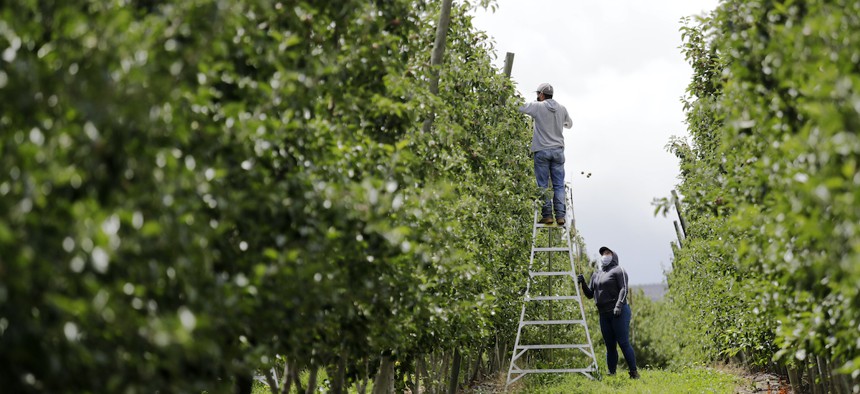States and Counties Mandate Covid-19 Testing for Farm Workers

In this photo taken Tuesday, June 16, 2020, a supervisor looks up at a worker pulling honey crisp apples off trees during a thinning operation at an orchard in Yakima, Wash. Associated Press
A handful of states and counties are requiring Covid-19 testing for farm and food-processing workers after several clusters of positive cases were traced back to agricultural facilities.
A handful of states and counties are creating Covid-19 testing mandates for agricultural workers after clusters of positive cases were linked to farms, labor camps and food-packing facilities across the country.
Agricultural workers have a higher risk of contracting Covid-19 due to their lack of health insurance and living conditions, experts say, noting that many seasonal farmworkers, for example, will be housed together and travel to and from work in groups.
“Overcrowded and substandard housing conditions are a major concern for the potential of Covid-19 to spread through agricultural worker communities,” according to a fact sheet compiled by the nonprofit National Center for Farmworker Health. “A single building may house several dozen workers or more, who often sleep in dormitory-style quarters, making quarantining or social-distancing efforts difficult, if not impossible.”
Government officials across the country have sought to address that risk by ensuring access to Covid-19 testing, but policies are piecemeal and inconsistent. As of mid-July, only eight states had established mandatory regulations to protect agricultural workers from Covid-19, while an additional 16 have issued testing recommendations but stopped short of official policies, according to the nonprofit.
Others have ramped up existing policies. For example, Washington Gov. Jay Inslee last week updated a previous proclamation that requires agricultural employers to arrange free virus testing for their workers whenever there are more than nine cases among employees within a two-week period, or the “virus attack rate” equals or exceeds 10% of the workforce.
The testing must be “timely,” and anyone who refuses to participate is no longer permitted to work.
The update, issued Aug. 19, was prompted in part by a Covid-19 outbreak on a farm in Okanogon County, where 120 workers tested positive while another 156 awaited final results.
“There is no question that we need to escalate our response to this pandemic, and we know that additional focus must be placed on agricultural workplaces,” Inslee said in a statement that alluded to the fact that farm workers in Washington are largely Latino. "From the data, we know that people of color have been disproportionately impacted by this pandemic, and while we have much work to do to address that, this is one step in the right direction.”
In other places, county governments have created local testing policies in addition to state-level regulations. For example, the department of health in Erie County, located on the shore of Lake Erie in western New York state, announced last week that it would provide free testing for agricultural workers alongside a state program that dispatches mobile testing teams to counties with the highest influx of seasonal farm workers.
The program, coordinated with a local health provider, distributes free test kits to farms, allowing employees to collect and submit their own saliva samples. Officials said that method was chosen specifically to suit the lifestyle of agricultural workers, who work long shifts and may not own their own cars, making it difficult to stop by a designated testing site during regular business hours.
“Given the nature of agricultural work, it may be impractical for some farm workers to visit one of our county diagnostic test sites or community sites,” Dr. Gale Burstein, the county’s health commissioner, said in a statement. “This is an innovative strategy to identify Covid cases in our community and keep our agricultural workers healthy and the food supply chain safe.”
Other efforts have been met with controversy. In Michigan, an emergency testing order for farm workers was challenged in court by several farmers, employees and agricultural organizations, which said the mandatory policy violated the civil rights of the Hispanic and Latino community.
A federal judge earlier this month denied a request to place a hold on the order while the lawsuit makes its way through the court system, meaning farm and food processing workers are still subject to the policy during litigation. Facilities had until Aug. 24 to comply with the order.
Kate Elizabeth Queram is a staff correspondent for Route Fifty and is based in Washington, D.C.
NEXT STORY: Covid + Influenza: This Is a Good Year to Get a Flu Shot, Experts Advise





